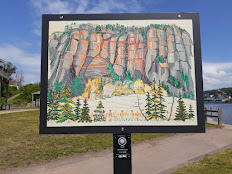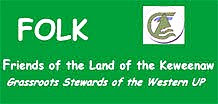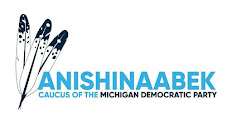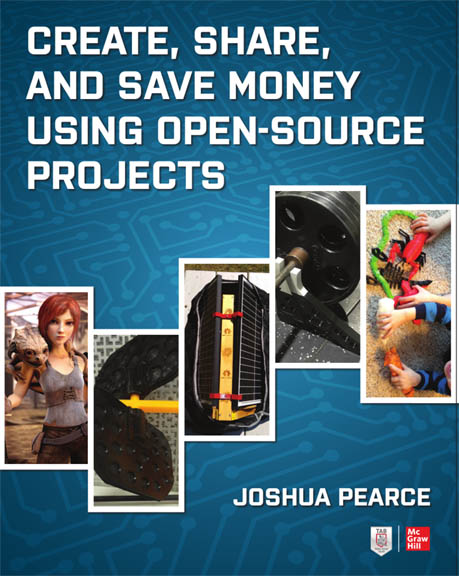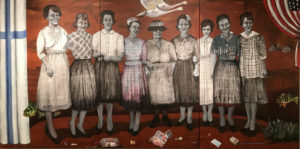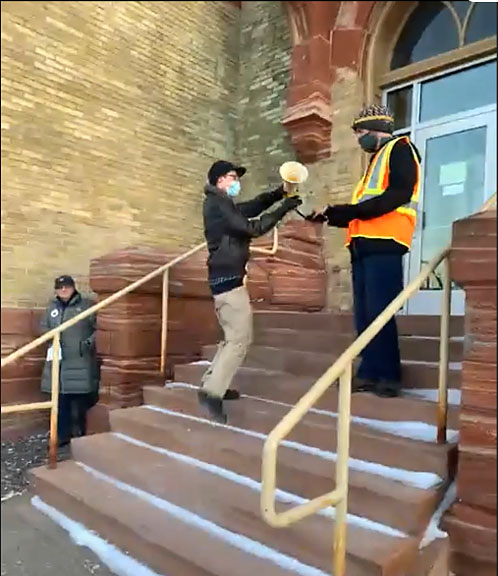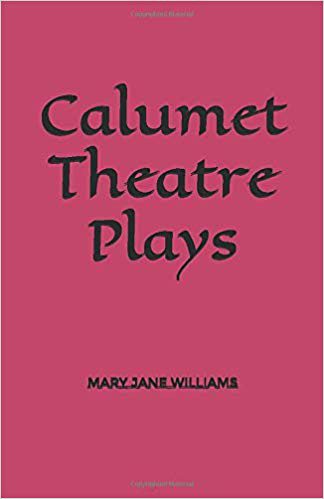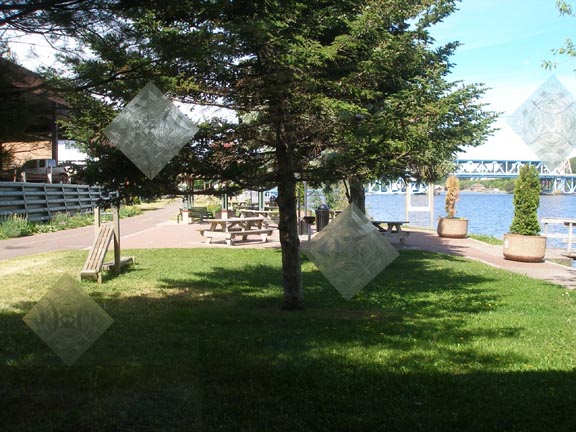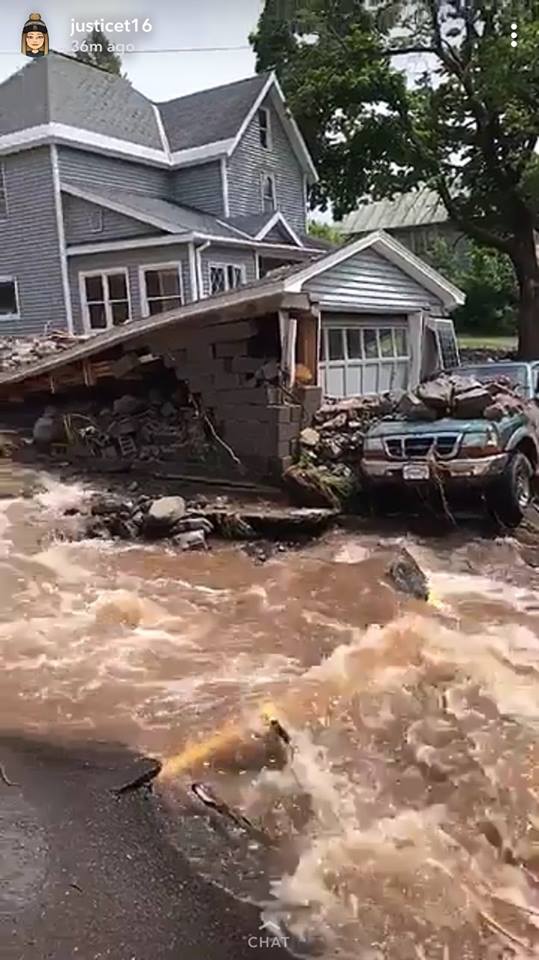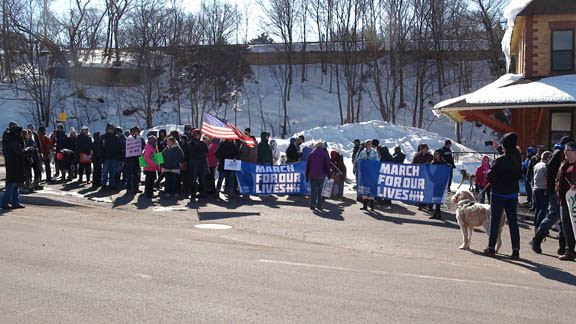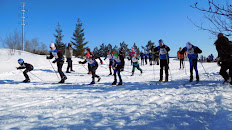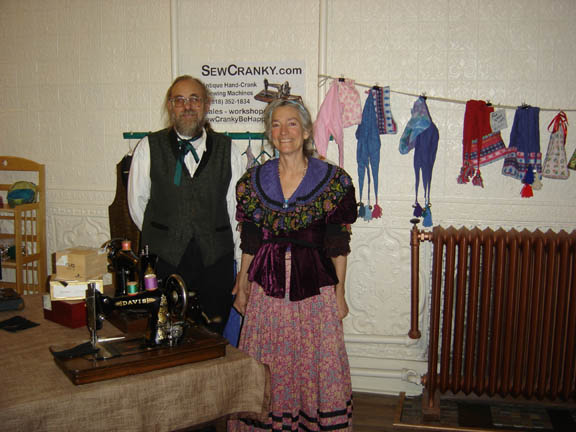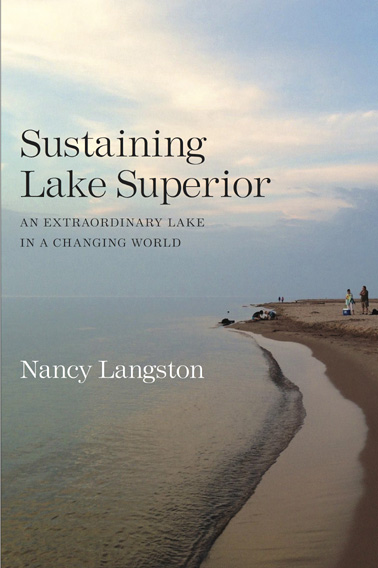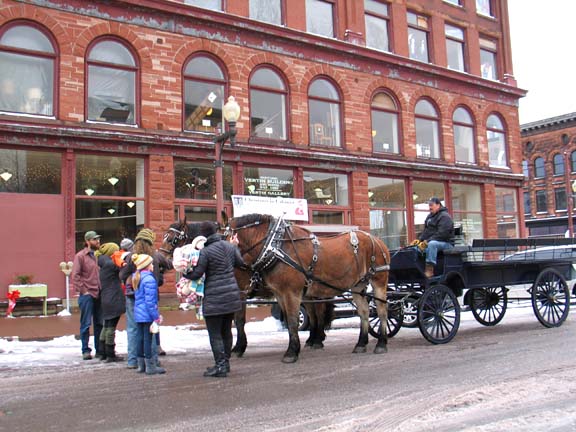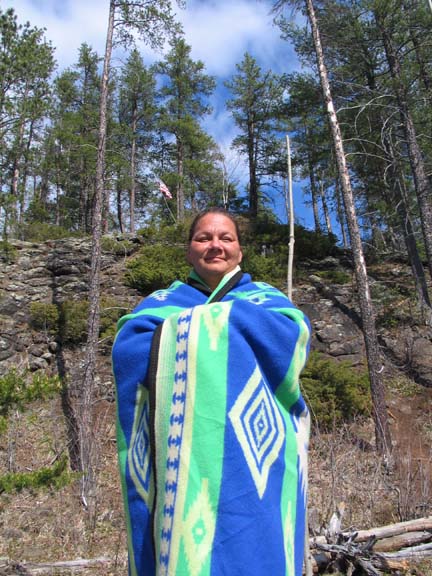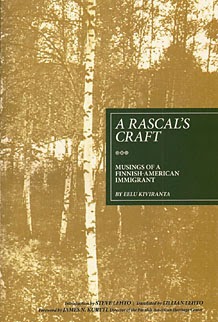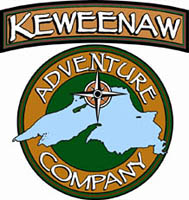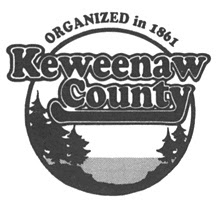Isle Royale wolf. (Photo © and courtesy Rolf Peterson)
HOUGHTON -- Isle Royale National Park (ISRO) released for public review and comment the draft Environmental Impact Statement to Address the Presence of Wolves (draft EIS). The wolf population has declined to just two wolves in the past five years and scientists believe that natural recovery of the population is unlikely.
The draft EIS is open for public review and comment for 90 days, concluding March 15, 2017. Click here to read the draft EIS and comment on it.
The draft EIS evaluates four alternatives: a no-action alternative and three action alternatives. Alternative B is the National Park Service (NPS) preferred alternative. It calls for the immediate introduction of 20 to 30 wolves to the park over a three year period. The goal of the preferred alternative is the immediate introduction of enough wolves to the park to sustain a population.
Alternative A is no action. Under alternative C, the National Park Service would immediately introduce 6 - 15 wolves with the potential for subsequent introductions over a 20-year period in order to maintain a wolf population in the park. Alternative D provides continued monitoring with no immediate action to bring in wolves but the ability to do so in the future. The decision about future introductions would be based on moose population metrics and other observed changes in the ecosystem.
This slide from a July 2015 Open House presentation in Houghton by Andrew Coburn, NPS environmental protection specialist and project manager for the Isle Royale management plan/EIS, outlines the estimated schedule NPS has been following to prepare the Moose-Wolf-Vegetation Management Plan and Environmental Impact Statement (plan/EIS). The Draft Plan/EIS now available for public review concerns the presence of wolves on the island.*
"This is about more than wolves," Park Superintendent Phyllis Green said. "It’s about the entire park ecosystem and where it is heading in the future with changing conditions. This is a complex issue to address. We have sought input from subject matter experts to evaluate the situation, and we would like to hear from the public on the current draft plan."
Click here to read the purpose of the draft EIS and to see the time left in the comment period. A limited number of hard copies of the draft EIS are available at park headquarters as well as public libraries in Houghton and Marquette, Michigan; Superior, Wisconsin; and Duluth, Minnesota.
Comments may be submitted online as indicated above or by mailing or hand delivering comments to Superintendent Phyllis Green, Isle Royale National Park, ISRO Wolves, 800 East Lakeshore Drive, Houghton, Michigan 49931-1896.**
Public Meetings, Webinars to be held in February 2017
Isle Royale National Park will host public meetings and webinars to discuss the draft EIS in February, 2017. Meetings will be held in the Houghton area as well as other sites to be determined in Minnesota, Wisconsin, and/or Michigan. Dates, times and locations of these meetings will be announced in future news releases, on the park’s website, Isle Royale's Facebook page, and at https://parkplanning.nps.gov/projectHome.cfm?projectId=59316.
Editor's Notes:
* See our Aug. 25, 2015, article on the July 2015 Isle Royale National Park Open House, "Public comments on Isle Royale Moose-Wolf-Vegetation Management Plan/EIS due Aug. 29; wildlife experts concerned about wolf rescue" for discussion on the wolf management issue and video clips from the presentations.
** For more background on this issue see this April 2016 article by Allison Mills of the Michigan Tech News: Michigan Tech News: Two Wolves Remain on Isle Royale.
Tuesday, December 27, 2016
National Park Service seeks Public Comment on Draft Environmental Impact Statement to Address the Introduction of Wolves to Isle Royale
Wednesday, December 21, 2016
Plug In for renewable energy
An example of plug and play solar. (Photo courtesy Joshua Pearce and Michigan Tech University)
By Stefanie Sidortsova*
With additional information from Joshua Pearce
Posted Dec. 5, 2016, on Michigan Tech News
Reprinted here with permission
HOUGHTON -- A new study shows a huge US market for plug and play solar energy, with billions of dollars in retail sales and energy savings. So what's holding up widespread use?
Support for solar energy is vast. According to a 2015 Gallup poll, 79 percent of Americans want the US to put more emphasis on developing solar power. Most of the same people, unfortunately, can’t afford to install solar energy systems in their homes. Even after federal tax credits, installing solar panels to cover all of a family's electricity needs can cost tens of thousands of dollars. For others, a home solar system isn’t a consideration because they rent, or move frequently.
But Michigan Technological University’s Joshua Pearce says he knows the solution: plug and play solar.
"Plug and play systems are affordable, easy to install, and portable," says Pearce, associate professor of materials science and engineering and of electrical and computer engineering. "The average American consumer can buy and install them with no training."
In a study funded by the Conway Fellowship and published in Renewable Energy (DOI: 10.1016/j.renene.2016.11.034), Pearce and researchers Aishwarya Mundada and Emily Prehoda estimate that plug and play solar could provide 57 gigawatts of renewable energy -- enough to power the cities of New York and Detroit -- with potentially $14.3 to $71.7 billion in sales for retailers and $13 billion a year in cost savings for energy users.
Sounds great, right? Well, there’s one problem: in many parts of the United States, electrical regulations don’t allow consumers to plug and play.
Small Investment, Big Return
Plug and play solar panels connect to an ordinary electrical outlet. You’re still on the grid, but you’ve become a "prosumer" -- a consumer of energy who also produces it. The panels range in wattage and are relatively affordable, with some costing just a couple hundred dollars apiece. A prosumer can start small, with just one panel, and slowly build up over time to a system that produces 1 kilowatt of energy, the equivalent of powering 10 100-watt LED light bulbs.
The panels are also portable. So, for example, if a college student buys one 250-watt plug and play panel each year for four years, reaching 1 kilowatt of energy by senior year, that student can unplug the four panels when she graduates and take them to her next destination.
"The technology is already there. Europeans do this all the time." Joshua Pearce
Pearce estimates that plug and play systems could generate more than four times the amount of electricity generated from all of US solar last year.
"The vast majority of this energy never leaves the home," Pearce says. "It’s the equivalent of handling a hair dryer load. We’re talking about almost nothing on the electrical grid -- but that nothing adds up. It’s an appliance with a high rate of return."
Safe, Simple -- And Largely Prohibited
In the United States, a patchwork of local jurisdictions and regulations make it difficult to figure out if and where plug and play panels are allowed.
"You can buy the panels," Pearce says, "but you might not be able to plug them in, depending on your utility."
Pearce cites the Upper Peninsula Power Company (UPPCO) as an example of a utility that prohibits this plug and play solar use.
"UPPCO has hit their self-imposed 1 percent limit (the minimum the state mandates they allow) for all net metering of any kind," Pearce notes. "This makes both new traditional solar photovoltaic (PV) systems and new plug and play PV systems unable to connect now unless consumers 1) use a transfer switch that can switch various home circuits from grid to the solar so if you have extra solar power, you just put more load on that system, 2) use a battery back up system, or 3) simply leave the grid. The latter is possible to do economically in this region by combining solar, a small battery bank and a cogen system (a technology that produces both electricity and heat -- usually from natural gas).
"We essentially have the highest electric rates in the country and UP customers are being blocked by financing their own less-expensive grid tied solar systems to protect a short-term utility monopoly. As grid defection becomes a progressively more profitable investment for many people in the UP, utilities that follow this short-sighted strategy risk losing significant fractions of their customer base. Our earlier analysis showed 92 percent of seasonal households and ~75 percent of year-round households are projected to meet electricity demands with lower costs using their own PV+battery+cogen systems."
In a paper published earlier this year in Solar Energy (DOI: 10.1016/j.solener.2016.06.002), Pearce, Mundada and researcher Yuenyong Nilsiam reviewed all regulations in the US that would apply to plug and play systems. They found no safety or technical issues with the equipment on the market.
"This is an area where less regulation could really help renewable energy," Pearce says. "We know that the technology is safe, and the law should reflect that."
The risk, according to Pearce, is putting too much current on one circuit, so he recommends that homeowners keep their plug and play systems to a kilowatt or less. Simple precautions make this easy -- if a panel is plugged into an outdoor outlet, for example, safety plugs on all other outdoor outlets on that circuit can prevent overload.
While some jurisdictions have recognized that there are no major safety or technical issues with plug and play panels, paperwork holds up the process. Potential prosumers often have to fill out complicated forms to fulfill utility requirements, and the paperwork and associated fees vary by utility. To simplify the process, Pearce and colleagues automated it, by writing open-source computer code that fills out every possible technical requirement. Utilities can easily use the free code on their websites.
"Some utilities have embraced plug and play, and some have ignored it because they think it’s a pittance," Pearce says. "But plug and play solar is something that can help most Americans."
Inset Photo: Joshua Pearce. (Photo courtesy Michigan Tech University)
* Editor's Note: Guest author Stefanie Sidortsova is a Science and Technology Publications writer for Michigan Tech University.
By Stefanie Sidortsova*
With additional information from Joshua Pearce
Posted Dec. 5, 2016, on Michigan Tech News
Reprinted here with permission
HOUGHTON -- A new study shows a huge US market for plug and play solar energy, with billions of dollars in retail sales and energy savings. So what's holding up widespread use?
Support for solar energy is vast. According to a 2015 Gallup poll, 79 percent of Americans want the US to put more emphasis on developing solar power. Most of the same people, unfortunately, can’t afford to install solar energy systems in their homes. Even after federal tax credits, installing solar panels to cover all of a family's electricity needs can cost tens of thousands of dollars. For others, a home solar system isn’t a consideration because they rent, or move frequently.
But Michigan Technological University’s Joshua Pearce says he knows the solution: plug and play solar.
"Plug and play systems are affordable, easy to install, and portable," says Pearce, associate professor of materials science and engineering and of electrical and computer engineering. "The average American consumer can buy and install them with no training."
In a study funded by the Conway Fellowship and published in Renewable Energy (DOI: 10.1016/j.renene.2016.11.034), Pearce and researchers Aishwarya Mundada and Emily Prehoda estimate that plug and play solar could provide 57 gigawatts of renewable energy -- enough to power the cities of New York and Detroit -- with potentially $14.3 to $71.7 billion in sales for retailers and $13 billion a year in cost savings for energy users.
Sounds great, right? Well, there’s one problem: in many parts of the United States, electrical regulations don’t allow consumers to plug and play.
Small Investment, Big Return
Plug and play solar panels connect to an ordinary electrical outlet. You’re still on the grid, but you’ve become a "prosumer" -- a consumer of energy who also produces it. The panels range in wattage and are relatively affordable, with some costing just a couple hundred dollars apiece. A prosumer can start small, with just one panel, and slowly build up over time to a system that produces 1 kilowatt of energy, the equivalent of powering 10 100-watt LED light bulbs.
The panels are also portable. So, for example, if a college student buys one 250-watt plug and play panel each year for four years, reaching 1 kilowatt of energy by senior year, that student can unplug the four panels when she graduates and take them to her next destination.
"The technology is already there. Europeans do this all the time." Joshua Pearce
Pearce estimates that plug and play systems could generate more than four times the amount of electricity generated from all of US solar last year.
"The vast majority of this energy never leaves the home," Pearce says. "It’s the equivalent of handling a hair dryer load. We’re talking about almost nothing on the electrical grid -- but that nothing adds up. It’s an appliance with a high rate of return."
Safe, Simple -- And Largely Prohibited
In the United States, a patchwork of local jurisdictions and regulations make it difficult to figure out if and where plug and play panels are allowed.
"You can buy the panels," Pearce says, "but you might not be able to plug them in, depending on your utility."
Pearce cites the Upper Peninsula Power Company (UPPCO) as an example of a utility that prohibits this plug and play solar use.
"UPPCO has hit their self-imposed 1 percent limit (the minimum the state mandates they allow) for all net metering of any kind," Pearce notes. "This makes both new traditional solar photovoltaic (PV) systems and new plug and play PV systems unable to connect now unless consumers 1) use a transfer switch that can switch various home circuits from grid to the solar so if you have extra solar power, you just put more load on that system, 2) use a battery back up system, or 3) simply leave the grid. The latter is possible to do economically in this region by combining solar, a small battery bank and a cogen system (a technology that produces both electricity and heat -- usually from natural gas).
"We essentially have the highest electric rates in the country and UP customers are being blocked by financing their own less-expensive grid tied solar systems to protect a short-term utility monopoly. As grid defection becomes a progressively more profitable investment for many people in the UP, utilities that follow this short-sighted strategy risk losing significant fractions of their customer base. Our earlier analysis showed 92 percent of seasonal households and ~75 percent of year-round households are projected to meet electricity demands with lower costs using their own PV+battery+cogen systems."
In a paper published earlier this year in Solar Energy (DOI: 10.1016/j.solener.2016.06.002), Pearce, Mundada and researcher Yuenyong Nilsiam reviewed all regulations in the US that would apply to plug and play systems. They found no safety or technical issues with the equipment on the market.
"This is an area where less regulation could really help renewable energy," Pearce says. "We know that the technology is safe, and the law should reflect that."
The risk, according to Pearce, is putting too much current on one circuit, so he recommends that homeowners keep their plug and play systems to a kilowatt or less. Simple precautions make this easy -- if a panel is plugged into an outdoor outlet, for example, safety plugs on all other outdoor outlets on that circuit can prevent overload.
While some jurisdictions have recognized that there are no major safety or technical issues with plug and play panels, paperwork holds up the process. Potential prosumers often have to fill out complicated forms to fulfill utility requirements, and the paperwork and associated fees vary by utility. To simplify the process, Pearce and colleagues automated it, by writing open-source computer code that fills out every possible technical requirement. Utilities can easily use the free code on their websites.
"Some utilities have embraced plug and play, and some have ignored it because they think it’s a pittance," Pearce says. "But plug and play solar is something that can help most Americans."
Inset Photo: Joshua Pearce. (Photo courtesy Michigan Tech University)
* Editor's Note: Guest author Stefanie Sidortsova is a Science and Technology Publications writer for Michigan Tech University.
Friday, December 16, 2016
An open Letter to Electors
Note: This letter was published in the Washington Post, Philadelphia Inquirer, Austin American-Statesman, Salt Lake City Tribune and Tampa Bay Times on Dec. 14, 2016. It was published in the Atlanta Journal-Constitution and the Wisconsin State Journal on Dec. 15, 2016. Letter to Electors is a project of Democracy and Progress PAC and the Electoral College Petition.
Esteemed Electors:
We, a bipartisan coalition of Americans including Electors, scholars, officials, and concerned citizens write to you in the spirit of fellowship, out of our sense of patriotism, and with great urgency.
There are times in the life of a nation when extraordinary circumstances call for extraordinary measures. Now is a such time, and your courage and leadership are required.
Never in our Republic’s history has there been a President-apparent comparable to Donald Trump. His inauguration would present a grave and continual threat to the Constitution, to domestic tranquility, and to international stability:
You, Electors, possess the power to prevent this outcome. You are not bound to cast your vote for the candidate of your party -- and, as he won neither a majority nor even a plurality of the popular vote, there can be no question of undermining the will of The People.
The Constitution empowers Electors to exercise judgment and choice. If your role were only ceremonial, our Founders would not have required the states to elect you, or that you cast ballots by your own hand. State laws notwithstanding, you are free to vote your conscience. You have a mandate, like all officials, to protect and defend the Constitution. And you have the right and responsibility to investigate those who stand for this office, and to deliberate before casting your vote.
We place country before party in imploring you, our fellow Americans, to investigate and deliberate. We stand with you as you exercise your conscience and give profound consideration to the consequences of your vote. We affirm your right and your duty to do so free from intimidation, and urge you to cast your ballot for a person with the temperament, integrity and commitment to Constitutional principles necessary in a President.
In doing so, know that you enjoy the support of millions of Americans.
Thank you for your service to our country.
Read signatories here.
CLICK HERE for the PETITION.
Esteemed Electors:
We, a bipartisan coalition of Americans including Electors, scholars, officials, and concerned citizens write to you in the spirit of fellowship, out of our sense of patriotism, and with great urgency.
There are times in the life of a nation when extraordinary circumstances call for extraordinary measures. Now is a such time, and your courage and leadership are required.
Never in our Republic’s history has there been a President-apparent comparable to Donald Trump. His inauguration would present a grave and continual threat to the Constitution, to domestic tranquility, and to international stability:
- He has threatened the freedom of speech by condoning violence at public events, and suggesting criminal penalties and even revocation of citizenship to punish political expression;
- He has threatened the freedom of press by vowing to revoke First Amendment protections for journalists;
- He has threatened the freedom of religion by proposing to bar entry to the country and force the registration of members of certain faiths;
- He has entangled himself with foreign interests through his personal business dealings, and refused to provide records of his taxes, which could allay suspicions;
- He has indicated a willingness to condone torture, in contravention of the Constitution and our international treaties, which carry the force of law;
- He is uncomfortably close to the regime of Russia, which has interfered in the election;
- He has shown reckless disregard for diplomacy, communicating impulsively, in public forums, regarding matters of national security, and allowing personal emotions to interfere with reasoned judgment, calling into question his fitness as Commander-in-Chief of the Armed Forces and the nuclear capabilities of the United States;
- He has, unlike every previous Commander-in-Chief, never served in any public position, whether elected or appointed, civilian or military, thereby bringing no experience or proven judgment on behalf of The People, or evidence of a character suited to high office.
You, Electors, possess the power to prevent this outcome. You are not bound to cast your vote for the candidate of your party -- and, as he won neither a majority nor even a plurality of the popular vote, there can be no question of undermining the will of The People.
The Constitution empowers Electors to exercise judgment and choice. If your role were only ceremonial, our Founders would not have required the states to elect you, or that you cast ballots by your own hand. State laws notwithstanding, you are free to vote your conscience. You have a mandate, like all officials, to protect and defend the Constitution. And you have the right and responsibility to investigate those who stand for this office, and to deliberate before casting your vote.
We place country before party in imploring you, our fellow Americans, to investigate and deliberate. We stand with you as you exercise your conscience and give profound consideration to the consequences of your vote. We affirm your right and your duty to do so free from intimidation, and urge you to cast your ballot for a person with the temperament, integrity and commitment to Constitutional principles necessary in a President.
In doing so, know that you enjoy the support of millions of Americans.
Thank you for your service to our country.
Read signatories here.
CLICK HERE for the PETITION.
Wednesday, December 14, 2016
Local concerned citizens hold vigil in support of Standing Rock camp, call on Wells Fargo to divest from DAPL
By Michele Bourdieu, with photos and videos by Allan Baker
Concerned citizens set out from Good Shepherd Lutheran Church in Houghton for a vigil near the Wells Fargo Bank. Signs support the water protectors at Standing Rock, opposed to the Dakota Access Pipeline, and call for Wells Fargo to divest from Energy Transfer Partners, the oil company building the pipeline. (Photos by Allan Baker for Keweenaw Now)
HOUGHTON -- Regina Alleman, who volunteered as a nurse to help injured water protectors at Standing Rock in North Dakota, was nearly in tears as she described what she considered human rights violations against peaceful protesters during a discussion at Good Shepherd Lutheran Church in Houghton on Dec. 8, 2016 -- a few days after the U.S. Army Corps of Engineers (ACE) finally refused to approve an easement that will allow the proposed Dakota Access Pipeline (DAPL) to cross under Lake Oahe.*
Alleman was speaking to a group of local citizens who wished to show their solidarity with thousands of Native and non-Native people who have gathered peacefully in a huge camp in North Dakota to demonstrate against potential impacts to the drinking water and sacred sites of the Standing Rock Sioux Tribe. The Houghton group held a discussion before walking up College Avenue to stand a vigil near the local Wells Fargo Bank and call for the bank's divestment from DAPL.
Noting her shock at the human rights abuses perpetrated on the crowds of peaceful protesters, also known as water protectors, Alleman said this should be a concern of all Americans:
Regina Alleman, who volunteered as a nurse at Standing Rock, shares her experiences with a group of concerned citizens gathered at Good Shepherd Lutheran Church in Houghton, Mich., on Dec. 8, 2016. (Videos by Allan Baker for Keweenaw Now)
Rodney Loonsfoot, a member of the Keweenaw Bay Indian Community (KBIC) and a U.S. Marine Corps veteran, helped organized the Dec. 8 event.
"I have not been to standing rock YET," Loonsfoot told Keweenaw Now. "I was waiting for the second wave of veterans that was supposed to happen. The first bunch of veterans did the job and that weekend the ACE denied the permit. So our wave didn't go. Although the permit has been denied, we ask communities to continue to pray for our mother earth, our sacred water and for the new administration to respect our mother earth and stand to protect her."
Loonsfoot also spoke to the group at Good Shepherd during the discussion:
During the discussion at Good Shepherd Lutheran Church, preceding a vigil against DAPL investor Wells Fargo Bank, Rodney Loonsfoot of the Keweenaw Bay Indian Community (KBIC) speaks about the injustices against the water protectors at Standing Rock and the oil company's lack of respect for Native American sacred burial grounds.
Others added to the discussion with descriptions of some of the worst injuries suffered by water protectors at the hands of police and security forces using rubber bullets, pepper spray, and more:
Vigil participants comment on serious injuries suffered by peaceful water protectors, including eye injuries described here by Copper Harbor resident Donica Dravillas, who was accompanied by her daughter, Maddie. Donica recently made a trip to bring supplies to Standing Rock.
Jerry Jondreau, also a KBIC member, said the purpose of the Dec. 8 event was to show support for the people at Standing Rock and to raise awareness that Wells Fargo is an investor in the DAPL.
"The event was held for people to come together to show support for the No DAPL movement, share stories and provide a community of support for those affected emotionally, spiritually and physically," Jondreau explained. "After snacks and introductions the group walked to Wells Fargo with their signage."
The vigil participants stand near Wells Fargo Bank in Houghton, taking care not to block the sidewalk.
Good Shepherd Pastor Bucky Beach said the intent of the vigil was to raise awareness of how the DAPL is funded and to register people's concerns with Wells Fargo.
"It was to encourage them to look at the implications of their investments and to consider divesting, and investing in other ways," Pastor Beach noted.
Concerned citizens chant "Mni Wiconi / Water is Life!" (in Lakota and in English) and "Wells Fargo, divest!" during their vigil in support of the water protectors of Standing Rock. The event took place near the local branch of the Wells Fargo Bank. Wells Fargo is one of the investors in the Dakota Access Pipeline that threatens the water and sacred Native American sites in North Dakota.
William Thompson, a Finlandia student and U.S. Marine Corps veteran who visited Standing Rock, joined in the vigil.
"I was at the sacred stone camp donating supplies and helping with needs around camp," Thompson said. "I can best describe being at camp like standing on the divide of the yin and yang. Camp was a powerful sacred place filled with peaceful prayerful people sharing love for our earth and one another, and across the river there was razor wire, militarized police/vehicles with weapons. Many nations of indigenous people from Alaska to Peru were there standing in peaceful solidarity to protect the earth and our fresh water for everyone. While in orientation at camp we were told to maintain a state of prayer, make ourselves useful, look after the elders, be self sufficient, maintain nonviolence, and BRING IT HOME amongst others. I felt compelled to go to Standing Rock to honor my oath as a marine to defend against all threats foreign (or in this case) domestic. I attended the vigil to honor the request to bring it home."
William Thompson, center, Finlandia student and U.S. Marine Corps veteran, displays the bilingual sign, "Mni Wiconi/Water is Life" during the Dec. 8 vigil near Wells Fargo Bank in Houghton. Pictured also are, at left, Regina Alleman, and Donica Dravillas with her daughter, Maddie.
After the vigil, the group returned to Good Shepherd Lutheran Church for a Prayer Circle.
Pastor Beach said, "The prayer circle was to offer support to people at Standing Rock and prayers for the earth."
Miguel and Anita Levy of Chassell also participated in the vigil.
Miguel Levy said, in addition to raising awareness about the DAPL, the vigil was intended to demonstrate the role of financial institutions such as Wells Fargo in perpetuating environmental and social injustice.
"This has the effect of helping to organize resistance to DAPL," Miguel noted. "As to the effectiveness of this kind of protest activity, it should be seen in the broader context of what's going on nationally and internationally. Hundreds of protests against banks' funding of DAPL have taken place this month alone throughout the country and abroad. On December 1st alone there were at least 80 protests against funding DAPL -- from Alaska, to California, to Florida, in 30 states, and in Canada, Europe and Japan. Building strength to the resistance movement, as these actions show, is critical to defeating DAPL and strengthening the whole environmental movement."
* Editor's Note: See "Standing Rock Sioux Tribe’s statement on U.S. Army Corps of Engineers decision against easement."
Concerned citizens set out from Good Shepherd Lutheran Church in Houghton for a vigil near the Wells Fargo Bank. Signs support the water protectors at Standing Rock, opposed to the Dakota Access Pipeline, and call for Wells Fargo to divest from Energy Transfer Partners, the oil company building the pipeline. (Photos by Allan Baker for Keweenaw Now)
HOUGHTON -- Regina Alleman, who volunteered as a nurse to help injured water protectors at Standing Rock in North Dakota, was nearly in tears as she described what she considered human rights violations against peaceful protesters during a discussion at Good Shepherd Lutheran Church in Houghton on Dec. 8, 2016 -- a few days after the U.S. Army Corps of Engineers (ACE) finally refused to approve an easement that will allow the proposed Dakota Access Pipeline (DAPL) to cross under Lake Oahe.*
Alleman was speaking to a group of local citizens who wished to show their solidarity with thousands of Native and non-Native people who have gathered peacefully in a huge camp in North Dakota to demonstrate against potential impacts to the drinking water and sacred sites of the Standing Rock Sioux Tribe. The Houghton group held a discussion before walking up College Avenue to stand a vigil near the local Wells Fargo Bank and call for the bank's divestment from DAPL.
Noting her shock at the human rights abuses perpetrated on the crowds of peaceful protesters, also known as water protectors, Alleman said this should be a concern of all Americans:
Rodney Loonsfoot, a member of the Keweenaw Bay Indian Community (KBIC) and a U.S. Marine Corps veteran, helped organized the Dec. 8 event.
"I have not been to standing rock YET," Loonsfoot told Keweenaw Now. "I was waiting for the second wave of veterans that was supposed to happen. The first bunch of veterans did the job and that weekend the ACE denied the permit. So our wave didn't go. Although the permit has been denied, we ask communities to continue to pray for our mother earth, our sacred water and for the new administration to respect our mother earth and stand to protect her."
Loonsfoot also spoke to the group at Good Shepherd during the discussion:
Others added to the discussion with descriptions of some of the worst injuries suffered by water protectors at the hands of police and security forces using rubber bullets, pepper spray, and more:
Jerry Jondreau, also a KBIC member, said the purpose of the Dec. 8 event was to show support for the people at Standing Rock and to raise awareness that Wells Fargo is an investor in the DAPL.
"The event was held for people to come together to show support for the No DAPL movement, share stories and provide a community of support for those affected emotionally, spiritually and physically," Jondreau explained. "After snacks and introductions the group walked to Wells Fargo with their signage."
The vigil participants stand near Wells Fargo Bank in Houghton, taking care not to block the sidewalk.
Good Shepherd Pastor Bucky Beach said the intent of the vigil was to raise awareness of how the DAPL is funded and to register people's concerns with Wells Fargo.
"It was to encourage them to look at the implications of their investments and to consider divesting, and investing in other ways," Pastor Beach noted.
William Thompson, a Finlandia student and U.S. Marine Corps veteran who visited Standing Rock, joined in the vigil.
"I was at the sacred stone camp donating supplies and helping with needs around camp," Thompson said. "I can best describe being at camp like standing on the divide of the yin and yang. Camp was a powerful sacred place filled with peaceful prayerful people sharing love for our earth and one another, and across the river there was razor wire, militarized police/vehicles with weapons. Many nations of indigenous people from Alaska to Peru were there standing in peaceful solidarity to protect the earth and our fresh water for everyone. While in orientation at camp we were told to maintain a state of prayer, make ourselves useful, look after the elders, be self sufficient, maintain nonviolence, and BRING IT HOME amongst others. I felt compelled to go to Standing Rock to honor my oath as a marine to defend against all threats foreign (or in this case) domestic. I attended the vigil to honor the request to bring it home."
William Thompson, center, Finlandia student and U.S. Marine Corps veteran, displays the bilingual sign, "Mni Wiconi/Water is Life" during the Dec. 8 vigil near Wells Fargo Bank in Houghton. Pictured also are, at left, Regina Alleman, and Donica Dravillas with her daughter, Maddie.
After the vigil, the group returned to Good Shepherd Lutheran Church for a Prayer Circle.
Pastor Beach said, "The prayer circle was to offer support to people at Standing Rock and prayers for the earth."
Miguel and Anita Levy of Chassell also participated in the vigil.
Miguel Levy said, in addition to raising awareness about the DAPL, the vigil was intended to demonstrate the role of financial institutions such as Wells Fargo in perpetuating environmental and social injustice.
"This has the effect of helping to organize resistance to DAPL," Miguel noted. "As to the effectiveness of this kind of protest activity, it should be seen in the broader context of what's going on nationally and internationally. Hundreds of protests against banks' funding of DAPL have taken place this month alone throughout the country and abroad. On December 1st alone there were at least 80 protests against funding DAPL -- from Alaska, to California, to Florida, in 30 states, and in Canada, Europe and Japan. Building strength to the resistance movement, as these actions show, is critical to defeating DAPL and strengthening the whole environmental movement."
* Editor's Note: See "Standing Rock Sioux Tribe’s statement on U.S. Army Corps of Engineers decision against easement."
Friday, December 09, 2016
Little Brothers - Friends of the Elderly to host Christmas dinners; volunteers needed
HANCOCK -- On December 25, 2016, Christmas Day, Little Brothers - Friends of the Elderly will be hosting a traditional Holiday Dinner with candlelight, fresh flowers and live music. The dinners in Houghton, Hancock, Calumet, Copper City, South Range, Tapiola, Ontonagon and Baraga will begin at 2 p.m. Seniors who have no family nearby and will be alone for the holiday are welcome to attend. To make a reservation, call 906-482-6944.
Little Brothers will also be preparing and delivering meals for homebound elderly who cannot attend the holiday parties. Volunteers are needed to help with transportation, cooking, making desserts, set-up, serving and clean-up. Especially needed are volunteers to help with transporting the elderly to the Holiday dinners and/or delivering Christmas dinners and visiting homebound elders. To volunteer, please call 906-482-6944 or visit their Web site.
Thursday, December 08, 2016
From Offense to Prayer: Vets change their mission at Standing Rock
Pow wow at Standing Rock, honoring the veterans with a feather ceremony. Dec. 6, 2016. (Photo © and courtesy Kellie Stewart. Reprinted with permission)
By Barbara With*
Posted Dec. 8, 2016, on Wisconsin Citizens Media Cooperative
Reprinted here in part with permission
When veterans Wesley Clark Jr. and Michael Wood Jr. organized Veterans Stand for Standing Rock, a deployment document was created and distributed through social media. In it were instructions for veterans to meet up at Cannon Ball, North Dakota, on December 4, 2016, and stand as protectors of the water protectors there.
The North Dakota governor had just issued an emergency eviction order for the camps, and the U.S. Army Corps of Engineers had set a deadline for the protectors to leave the area by Monday, December 5. Water protectors had already been subjected to violent responses from the Morton County sheriff’s department and more was expected as the day of eviction approached. ... Click here to read the rest of this article on Wisconsin Citizens Media Cooperative.
*Editor's Note: Author Barbara With is a citizen journalist and water protector from La Pointe, Wis., who traveled recently to North Dakota to visit the Standing Rock water protectors. Keweenaw Now appreciates the reports, photos and articles she shares with us. Photographer Kellie Stewart has been traveling with Barbara With and recently posted some interesting photos of the weather there on her Facebook page.
By Barbara With*
Posted Dec. 8, 2016, on Wisconsin Citizens Media Cooperative
Reprinted here in part with permission
When veterans Wesley Clark Jr. and Michael Wood Jr. organized Veterans Stand for Standing Rock, a deployment document was created and distributed through social media. In it were instructions for veterans to meet up at Cannon Ball, North Dakota, on December 4, 2016, and stand as protectors of the water protectors there.
The North Dakota governor had just issued an emergency eviction order for the camps, and the U.S. Army Corps of Engineers had set a deadline for the protectors to leave the area by Monday, December 5. Water protectors had already been subjected to violent responses from the Morton County sheriff’s department and more was expected as the day of eviction approached. ... Click here to read the rest of this article on Wisconsin Citizens Media Cooperative.
*Editor's Note: Author Barbara With is a citizen journalist and water protector from La Pointe, Wis., who traveled recently to North Dakota to visit the Standing Rock water protectors. Keweenaw Now appreciates the reports, photos and articles she shares with us. Photographer Kellie Stewart has been traveling with Barbara With and recently posted some interesting photos of the weather there on her Facebook page.
Wednesday, December 07, 2016
New Slide Show: Christmas in Calumet 2016
Stopped in front of the Vertin Gallery in Calumet, Mich., on Dec. 3, 2016, Dean Nolan of Rocking W Stable in Eagle River, Wis., offers wagon rides during the Christmas in Calumet celebration. He will again offer rides from 11 a.m. to 3 p.m. on two more Saturdays, Dec. 10 and Dec. 17. (Photo by Keweenaw Now)
CALUMET -- Our new slide show features Christmas in Calumet on Dec. 3, 2016: Photos from the Poor Artists Sale, gallery exhibits on Fifth Street, and Santa at the Vertin Gallery.
To view the photos as a slide show, click here for the album. Then click on the first photo and follow the right arrows. To see the captions click on the info icon in the top right corner.
CALUMET -- Our new slide show features Christmas in Calumet on Dec. 3, 2016: Photos from the Poor Artists Sale, gallery exhibits on Fifth Street, and Santa at the Vertin Gallery.
To view the photos as a slide show, click here for the album. Then click on the first photo and follow the right arrows. To see the captions click on the info icon in the top right corner.
Monday, December 05, 2016
Standing Rock Sioux Tribe’s statement on U.S. Army Corps of Engineers decision against easement
Flags from the Bad River Band of Lake Superior Chippewa, left, and the Lac Courte Oreilles Band of Lake Superior Ojibwe are among hundreds of flags representing Native American water protectors at Standing Rock. Barbara With -- an independent journalist and water protector from northern Wisconsin, who arrived at the Standing Rock camp on Dec. 4 -- took this photo and learned of the U.S. Army Corps decision to deny an easement that would allow the proposed Dakota Access Pipeline to cross Lake Oahe. (Photo © and courtesy Barbara With)*
CANNON BALL, N.D. -- The department of the Army will not approve an easement that will allow the proposed Dakota Access Pipeline to cross under Lake Oahe. The following statement was released by Standing Rock Sioux Tribal Chairman Dave Archambault II on Sunday, Dec. 4, 2016:
Today, the U.S. Army Corps of Engineers announced that it will not be granting the easement to cross Lake Oahe for the proposed Dakota Access Pipeline. Instead, the Corps will be undertaking an environmental impact statement to look at possible alternative routes. We wholeheartedly support the decision of the administration and commend with the utmost gratitude the courage it took on the part of President Obama, the Army Corps, the Department of Justice and the Department of the Interior to take steps to correct the course of history and to do the right thing.
The Standing Rock Sioux Tribe and all of Indian Country will be forever grateful to the Obama Administration for this historic decision.
We want to thank everyone who played a role in advocating for this cause. We thank the tribal youth who initiated this movement. We thank the millions of people around the globe who expressed support for our cause. We thank the thousands of people who came to the camps to support us, and the tens of thousands who donated time, talent, and money to our efforts to stand against this pipeline in the name of protecting our water. We especially thank all of the other tribal nations and jurisdictions who stood in solidarity with us, and we stand ready to stand with you if and when your people are in need.
Throughout this effort I have stressed the importance of acting at all times in a peaceful and prayerful manner -- and that is how we will respond to this decision. With this decision we look forward to being able to return home and spend the winter with our families and loved ones, many of whom have sacrificed as well. We look forward to celebrating in wopila, in thanks, in the coming days.
We hope that Kelcey Warren, Governor Dalrymple, and the incoming Trump administration respect this decision and understand the complex process that led us to this point. When it comes to infrastructure development in Indian Country and with respect to treaty lands, we must strive to work together to reach decisions that reflect the multifaceted considerations of tribes. Treaties are paramount law and must be respected, and we welcome dialogue on how to continue to honor that moving forward. We are not opposed to energy independence, economic development, or national security concerns but we must ensure that these decisions are made with the considerations of our Indigenous peoples.
To our local law enforcement, I hope that we can work together to heal our relationship as we all work to protect the lives and safety of our people. I recognize the extreme stress that the situation caused and look forward to a future that reflects more mutual understanding and respect.
Again, we are deeply appreciative that the Obama Administration took the time and effort to genuinely consider the broad spectrum of tribal concerns. In a system that has continuously been stacked against us from every angle, it took tremendous courage to take a new approach to our nation-to-nation relationship, and we will be forever grateful.
Learn more about the Standing Rock Sioux Tribe at standwithstandingrock.net. For incremental updates please follow our Facebook page at Standing Rock Sioux Tribe or follow us on Twitter @standingrockst.
* Editor's Note:
Journalist Barbara With reported today, Dec. 5, 2016, on the gathering of veterans at Standing Rock, organized by Wesley Clark Jr, veteran and son of Wesley Clark, former Supreme Allied Commander Europe NATO. See her article, "Wesley Clark Jr Apologizes to Leonard Crow Dog for US Military Treatment of Indigenous People," posted today on Wisconsin Citizens Media Cooperative. The article includes a video of the ceremony, attended by 500 veterans.
CANNON BALL, N.D. -- The department of the Army will not approve an easement that will allow the proposed Dakota Access Pipeline to cross under Lake Oahe. The following statement was released by Standing Rock Sioux Tribal Chairman Dave Archambault II on Sunday, Dec. 4, 2016:
Today, the U.S. Army Corps of Engineers announced that it will not be granting the easement to cross Lake Oahe for the proposed Dakota Access Pipeline. Instead, the Corps will be undertaking an environmental impact statement to look at possible alternative routes. We wholeheartedly support the decision of the administration and commend with the utmost gratitude the courage it took on the part of President Obama, the Army Corps, the Department of Justice and the Department of the Interior to take steps to correct the course of history and to do the right thing.
The Standing Rock Sioux Tribe and all of Indian Country will be forever grateful to the Obama Administration for this historic decision.
We want to thank everyone who played a role in advocating for this cause. We thank the tribal youth who initiated this movement. We thank the millions of people around the globe who expressed support for our cause. We thank the thousands of people who came to the camps to support us, and the tens of thousands who donated time, talent, and money to our efforts to stand against this pipeline in the name of protecting our water. We especially thank all of the other tribal nations and jurisdictions who stood in solidarity with us, and we stand ready to stand with you if and when your people are in need.
Throughout this effort I have stressed the importance of acting at all times in a peaceful and prayerful manner -- and that is how we will respond to this decision. With this decision we look forward to being able to return home and spend the winter with our families and loved ones, many of whom have sacrificed as well. We look forward to celebrating in wopila, in thanks, in the coming days.
We hope that Kelcey Warren, Governor Dalrymple, and the incoming Trump administration respect this decision and understand the complex process that led us to this point. When it comes to infrastructure development in Indian Country and with respect to treaty lands, we must strive to work together to reach decisions that reflect the multifaceted considerations of tribes. Treaties are paramount law and must be respected, and we welcome dialogue on how to continue to honor that moving forward. We are not opposed to energy independence, economic development, or national security concerns but we must ensure that these decisions are made with the considerations of our Indigenous peoples.
To our local law enforcement, I hope that we can work together to heal our relationship as we all work to protect the lives and safety of our people. I recognize the extreme stress that the situation caused and look forward to a future that reflects more mutual understanding and respect.
Again, we are deeply appreciative that the Obama Administration took the time and effort to genuinely consider the broad spectrum of tribal concerns. In a system that has continuously been stacked against us from every angle, it took tremendous courage to take a new approach to our nation-to-nation relationship, and we will be forever grateful.
Learn more about the Standing Rock Sioux Tribe at standwithstandingrock.net. For incremental updates please follow our Facebook page at Standing Rock Sioux Tribe or follow us on Twitter @standingrockst.
* Editor's Note:
Journalist Barbara With reported today, Dec. 5, 2016, on the gathering of veterans at Standing Rock, organized by Wesley Clark Jr, veteran and son of Wesley Clark, former Supreme Allied Commander Europe NATO. See her article, "Wesley Clark Jr Apologizes to Leonard Crow Dog for US Military Treatment of Indigenous People," posted today on Wisconsin Citizens Media Cooperative. The article includes a video of the ceremony, attended by 500 veterans.
Sunday, December 04, 2016
Letter: Proposed SB 1187 to undo wolf protection is attempt to undermine will of Michigan voters
Michigan Wolf. (Photo courtesy Wolfwatchers)
Dear Editor:
Senator Tom Casperson has just introduced a new bill, SB 1187, which authorizes the unelected Natural Resources Commission to designate wolves as a game species and open a trophy hunting and commercial trapping season on them, should their federal Endangered Species Act protections be removed. But, as readers will remember, Michigan voters already voted on almost precisely the same measure just two years ago (Proposal 2), and rejected it in a landslide, with every single county in the Lower Peninsula voting against it (along with Chippewa County in the U.P.). The Michigan legislature should honor the expression of the will of the people and not countermand their very explicit judgment (64 percent opposed the Proposal 2).*
Please contact your Michigan legislators (find them at www.humanesociety.org/stateleglookup) and ask them to vote NO on SB 1187. In your correspondence with legislators feel free to use any of the following points:
Jill Fritz
Director, Wildlife Protection
The Humane Society of the United States
Editor's Notes:
* Click here to read the proposed SB 1187. Sen. Casperson introduced this bill on Dec. 1, 2016. This bill is in the Senate Calendar posted for this Tuesday, Dec. 6. Click here and scroll down to p. 11, Item 129. It could possibly be moved to the top of the agenda. Click here for the Humane Society's action alert to help you with a phone call or message to legislators.
UPDATE: You can also call Governor Snyder at (517) 373-3400 and urge him to veto any wolf hunting bill.
** According to Wikipedia, "Fladry is a line of rope mounted along the top of a fence, from which are suspended strips of fabric or colored flags that will flap in a breeze, intended to deter wolves from crossing the fence-line."
*** See our Oct. 27, 2014, article, "Wildlife Expert John Vucetich: Why he is voting 'no' on Proposals 1 and 2."
See also our Nov. 2, 2014, article, "Video report: Wolf hunt based on politics, not science -- why vote 'NO' on Proposals 1 and 2."
Dear Editor:
Senator Tom Casperson has just introduced a new bill, SB 1187, which authorizes the unelected Natural Resources Commission to designate wolves as a game species and open a trophy hunting and commercial trapping season on them, should their federal Endangered Species Act protections be removed. But, as readers will remember, Michigan voters already voted on almost precisely the same measure just two years ago (Proposal 2), and rejected it in a landslide, with every single county in the Lower Peninsula voting against it (along with Chippewa County in the U.P.). The Michigan legislature should honor the expression of the will of the people and not countermand their very explicit judgment (64 percent opposed the Proposal 2).*
Please contact your Michigan legislators (find them at www.humanesociety.org/stateleglookup) and ask them to vote NO on SB 1187. In your correspondence with legislators feel free to use any of the following points:
- In the November 2014 general election, in addition to rejecting the idea of turning over a wolf hunting decision to the Natural Resources Commission, voters also rejected wolf hunting as authorized directly by legislators. Michiganders opposed that measure by a double digit margin. In short, Michigan voters rejected, by wide margins, two wolf hunting laws that were submitted as referendum Proposal 1 and Proposal 2. These were the first two public votes on the issue of wolf hunting in the nation, and as a result, Michigan lawmakers have the best data set to support the argument that the public does not support sport hunting and trapping of wolves.
- Wolves in the Great Lakes region (Minnesota, Wisconsin, and Michigan) are currently under the protection of the federal Endangered Species Act, and cannot be hunted or trapped for recreation. However, if wolves were delisted in the Great Lakes again, two Michigan laws, PA 290 and PA 318 of 2008, authorizing the removal or killing of wolves attacking livestock or pets, would go back into effect. In addition, even while wolves remain under Endangered Species Act protection, the U.S. Code does authorize the killing of wolves that are even perceived to be a threat to humans. In short, ample protections already exist for any wolf conflicts. There is no reason for Michigan to authorize wolf hunting while federal law forbids that activity.
- The Michigan Department of Natural Resources (DNR) already provides the state’s ranchers with fencing, fladry, and guard animals to protect livestock from native carnivores, and has stated that these methods are highly effective.** Michigan livestock owners are also compensated for confirmed or even suspected losses to wolves. Still, cases of wolves killing livestock in Michigan are extremely rare, amounting to just .0005 percent of livestock deaths in 2015. This percentage is even lower than the US Department of Agriculture (USDA) nationwide statistics, which put wolves at the very bottom, at .2 percent, of the list of hazards to livestock that include respiratory, digestive, and calving problems, weather, disease, lameness, injury, theft, even vultures. Moreover, scientific studies have amply demonstrated that indiscriminate killing of wolves by hunting is not only ineffective at mitigating conflicts with livestock, it could even make those few problems worse by dispersing packs and sending inexperienced juvenile wolves out on their own.
- Wolves are shy and avoid humans as much as possible. On the rare occasion when wolves have been spotted in populated areas of the U.P., it was typically the result of humans drawing them into town by feeding deer, wolves’ preferred prey. But even in those instances, wolves did not threaten or harm humans. Even when wolves are protected under the federal Endangered Species Act, they can still be killed by officials if they are even perceived to be a threat. Further, recent stories of wolf sightings on private property in some U.P. towns have not been substantiated, nor were official reports of those incidents filed with the Michigan DNR as is required.
- Nor have accounts of negative impacts on Michigan’s deer population by wolves been substantiated. The Michigan DNR recently reported that even after years of harsh winters, its 2015 deer hunt showed that "Hunter satisfaction was up this year across all categories measured -- number of deer seen, number of bucks seen, overall hunting experience and deer harvested."
- The recovery of wolves also provides essential benefits to Michigan’s ecosystem. As recently underscored by a Michigan DNR/University of Notre Dame study, wolves play a significant role in the Great Lakes ecosystem by reducing densities of deer, beavers, and other species, even protecting timber stocks and agriculture crops by reducing deer overbrowse. And by controlling deer populations, wolves can also help to mitigate the risk of car-deer collisions. Thus, wolves can benefit agriculture, public safety, water quality, and ecosystem health.
- A virtual flood of scientific studies in the past few years have made it abundantly clear: there is no justification for killing wolves simply for trophies, out of hatred, to protect livestock, or in a misguided attempt to boost prey species for hunters.***
Jill Fritz
Director, Wildlife Protection
The Humane Society of the United States
Editor's Notes:
* Click here to read the proposed SB 1187. Sen. Casperson introduced this bill on Dec. 1, 2016. This bill is in the Senate Calendar posted for this Tuesday, Dec. 6. Click here and scroll down to p. 11, Item 129. It could possibly be moved to the top of the agenda. Click here for the Humane Society's action alert to help you with a phone call or message to legislators.
UPDATE: You can also call Governor Snyder at (517) 373-3400 and urge him to veto any wolf hunting bill.
** According to Wikipedia, "Fladry is a line of rope mounted along the top of a fence, from which are suspended strips of fabric or colored flags that will flap in a breeze, intended to deter wolves from crossing the fence-line."
*** See our Oct. 27, 2014, article, "Wildlife Expert John Vucetich: Why he is voting 'no' on Proposals 1 and 2."
See also our Nov. 2, 2014, article, "Video report: Wolf hunt based on politics, not science -- why vote 'NO' on Proposals 1 and 2."
Thursday, December 01, 2016
First Friday Art Walk, Christmas Tree Lighting begin Christmas in Calumet holiday events
Art by Donna Lenard. (Photo courtesy Galerie Bohème)
CALUMET -- Christmas in Calumet, with the lighting of the Christmas tree, and the First Friday, Dec. 2, Art Walk begin a weekend of holiday activity in Calumet. During your visits to the new art exhibits Friday evening, take time for the annual Christmas Tree Lighting at 7 p.m. next to the Calumet Theatre. Everyone is welcome to join in singing carols outside and enjoy refreshments in the Theatre Ballroom afterward.
Galerie Bohème and Copper Country Associated Artists: Watercolor Artist Donna Lenard
Galerie Bohème, 423 5th St., will host an exhibit by Donna Lenard, watercolor artist, with a reception from 6:30 p.m.- 9 p.m.on First Friday, Dec. 2.
Art by Donna Lenard. (Photo courtesy Galerie Bohème)
Lenard grew up in Arlington Heights, Ill., and took a few art classes in high school. She is a self-taught watercolor artist and has been painting everyday for the last 15 years. When she moved to the Upper Peninsula Lenard started drawing detailed birds in pencil. She lived in Rockland ,Mich., for seven years. Besides enjoying canoeing and snowshoeing, Lenard started to experiment with watercolors. Her life dream was to live in Alaska so she moved to Fairbanks, joined the Fairbanks Watercolor Society and received good guidance as a fledgling artist.
Lenard currently resides in Hancock and participates in The Poor Artists Sale, the Keweenaw Art Affair and Copper Harbor's Art in the Park. Lenard now teaches her techniques in both painting and drawing at the Porcupine Mountains Folk School, the Calumet Art Center, Copper Country Associated Artists, Holistic Center in Chassell and at her studio.
Regular gallery hours are Tuesday through Saturday, 1 p.m. - 4 p.m. For more information or a viewing appointment please call 906- 369-4087.
Calumet Art Center: Artist Jim Dee, holiday gifts
Celebrate First Friday with the Calumet Art Center, 57055 5th St., open from 10 a.m. to 8 p.m. on Dec. 2. Stop in and meet Artist Jim Dee, who has 10 years’ experience teaching high school art and 8 years as a professional artist. Jim will have some of his work on display and will be offering painting classes in the new year!
The Center has an incredible assortment of new items for your holiday gifting. You will find new unique one of a kind clay bells, a trio of clay sleigh bells dangling from red willow, new 906 ornaments, Christmas web ornaments, wool pillows filled with balsam, fresh green wreaths and much more. Local artists have come together to donate miniatures for sale as fundraisers. Elsa Mugford has generously donated some of her latest clay works as well.
Paige Wiard Gallery: Art inspired by nature
On Keweenaw's Eastern Shore. Art by Susan Robinson. (Photo courtesy Paige Wiard Gallery)
Local and regional artists have been asked to create works of art inspired by nature that will be on display in the Paige Wiard Gallery, 109 5th St., for the month of December. An opening reception will be held from 6 p.m. to 8 p.m. in the Gallery. The public is invited to get inspired by the beauty of nature and see unique takes on the classic theme of nature. For more information please contact the gallery at paigewiardgallery@gmail.com or 906-337-5970.
Café Rosetta: Photography by Brita Caroline
For December Café Rosetta, 104 5th St., is featuring Brita Caroline photography -- local nature scenes captured at the lake -- nautical, flowers, leaves, etc. Check out the art and enjoy Poetry with Renee at 6:30 p.m.
Hahn Hammered Copper: Unusual items, hand-crafted soap, more ...
Stop in at Hahn Hammered Copper, 203 5th St., this First Friday evening to see what’s Merry and Bright! Rochelle D. and Mrs. Grimm have decked the halls with shiny copper and unusual items like Rochelle’s original Sphericals and Mrs. G.’s ornamental found objects. Check out the lovely fragrant soaps hand-crafted by Jones on Smith Avenue, Folk Artist Jerry Hammes’ winter scenes, plenty of antiques, and many cool re-purposed pieces. As always, Hahns will have their own fabulous hand-hammered copper and vintage copperware made by well-known Copper Country coppersmiths!
Calumet Floral and Gifts: Wreath Decorating Workshop
Calumet Floral and Gifts, 221 5th St., is holding a hands on wreath decorating workshop from 6 p.m. - 9 p.m. Reservations are needed to secure supplies! Each participant will receive a fresh evergreen wreath to decorate. A variety of ribbons and trims will be available to choose from. Designers will be on hand to help and teach as needed. Experience the joy of design!! Cost: $25 per wreath. RSVP to 337-1711. The store is also dressed for the holidays and loaded with gift giving ideas and gift making supplies!
Vertin Gallery and Antiques: Artist and Musician Justin Plichta
The Vertin Gallery, 220 Sixth St., presents "A Christmas Story" from 6 p.m. to 8 p.m. for First Friday, Dec. 2. The Vertin has a broad selection of beautiful art, estate finds, and amazing treasures to make your Christmas story one they'll remember for years to come. Featured artist Justin Plichta is a Keweenaw native raised in Houghton. He earned a bachelor's degree in Scientific and Technical Communications from Michigan Tech and currently owns and operates Jj Video Productions located in Hancock. Justin has also written, produced, and performed music locally over the last decade. Sketching and painting portraits and figures with charcoal, oil, watercolor, and acrylics has become his latest creative outlet.
December brings the joy and magic of the holiday, and Main Street Calumet is bringing Santa and his elves from 11 a.m. - 3 p.m. Saturdays Dec. 3, 10 and 17 along with gorgeous Clydesdales pulling Santa's carriage to The Vertin, where you'll find authentic and reflective antiques, modern mid-century furniture, fine art, jewelry, lamps, bar cabinets and accessories, plus sophisticated and kitchy decor for your home. The Vertin is a co-op family of artists and lovers all things old and unique. Currently open for consignment of Artwork, Vintage, Antiques and quality furniture. Pre-estate planning and consultation available. Call 906-934-2655. Open Friday and Saturday noon - 6 p.m. or by appointment.
Copper Country Associated Artists: Holiday Open House
Copper Country Associated Artists, 205 5th St., will hold a Holiday Open House from 6 p.m. - 8 p.m. Friday, Dec. 2. This year the gallery artists have added a few more of their works of art for this gift giving season celebration. Refreshments will be served. Call 337-1252 for more information.
Cross Country Sports: Local artists' new work, Open House
Cross Country Sports, 507 Oak Street, will hold a Holiday Open House from 6 p.m. to 9 p.m. Friday, Dec.2. Enjoy holiday cookies and refreshments while shopping for unique gifts in a warm and inviting downtown setting! For the month of December, Cross Country Sports will feature new works by local artists: Metal prints and 2017 calendars by Jeremy Rowe - Night Sky Photography; jewelry by Annele Sakari—Hello Starling Designs; nature inspired jewelry by Jackie Ellenich - Designs by Jak; new water color prints and cards by Barbara Flanagin - Amorosi Artworks; jewelry and cards by Nina Ollis; pottery mugs and bowls by Elaine Eikenberry and slip pottery vessels by Jess Kane!
While you are here, check out the great selection of cross country skis, snowshoes, snowbikes and outdoor apparel -- everything you need for a healthy and happy new year! For more information call 337-4520, www.crosscountrysports.com or Facebook.
Christmas in Calumet Schedule:
Christmas in Calumet wagon rides begin Saturday, Dec. 3. (Photo courtesy Main Street Calumet)
In addition to the First Friday Art Walk and Christmas Tree Lighting (see above) here are some Saturday events:
Saturdays, Dec. 3, 10, 17: free horse drawn wagon rides from 11 a.m. - 3 p.m., throughout downtown Calumet. Wagon stops at Keweenaw Coffee Works, Copper World and the Vertin Gallery.
Saturdays, Dec. 3, 10, 17, 24: Santa will be at the Vertin Gallery from from 11 a.m. - 3 p.m.
Saturday, Dec. 3: Keweenaw National Historical Park will be holding a Holiday Open House at the Visitor's Center from 11 a.m. - 3 p.m. Children can create a tree ornament and refreshments will be served. Everyone will also enjoy 10 percent off at the Visitor's Center Bookstore.
Saturday, Dec. 3, 10 a.m. - 5 p.m.: Keweenaw Coffee Works is having an Ugly Sweater Party with in- store specials.
Saturday, Dec. 3, is the Annual Poor Artists Sale at CLK Schools. (See our right-hand column)
Saturday, Dec. 10: The Copper Dog Kids Rides event will be held in Agassiz Park from 1 p.m. - 3 p.m. Kids can pet the dog, go for a ride and enjoy refreshments.
CALUMET -- Christmas in Calumet, with the lighting of the Christmas tree, and the First Friday, Dec. 2, Art Walk begin a weekend of holiday activity in Calumet. During your visits to the new art exhibits Friday evening, take time for the annual Christmas Tree Lighting at 7 p.m. next to the Calumet Theatre. Everyone is welcome to join in singing carols outside and enjoy refreshments in the Theatre Ballroom afterward.
Galerie Bohème and Copper Country Associated Artists: Watercolor Artist Donna Lenard
Galerie Bohème, 423 5th St., will host an exhibit by Donna Lenard, watercolor artist, with a reception from 6:30 p.m.- 9 p.m.on First Friday, Dec. 2.
Art by Donna Lenard. (Photo courtesy Galerie Bohème)
Lenard grew up in Arlington Heights, Ill., and took a few art classes in high school. She is a self-taught watercolor artist and has been painting everyday for the last 15 years. When she moved to the Upper Peninsula Lenard started drawing detailed birds in pencil. She lived in Rockland ,Mich., for seven years. Besides enjoying canoeing and snowshoeing, Lenard started to experiment with watercolors. Her life dream was to live in Alaska so she moved to Fairbanks, joined the Fairbanks Watercolor Society and received good guidance as a fledgling artist.
Lenard currently resides in Hancock and participates in The Poor Artists Sale, the Keweenaw Art Affair and Copper Harbor's Art in the Park. Lenard now teaches her techniques in both painting and drawing at the Porcupine Mountains Folk School, the Calumet Art Center, Copper Country Associated Artists, Holistic Center in Chassell and at her studio.
Regular gallery hours are Tuesday through Saturday, 1 p.m. - 4 p.m. For more information or a viewing appointment please call 906- 369-4087.
Calumet Art Center: Artist Jim Dee, holiday gifts
Celebrate First Friday with the Calumet Art Center, 57055 5th St., open from 10 a.m. to 8 p.m. on Dec. 2. Stop in and meet Artist Jim Dee, who has 10 years’ experience teaching high school art and 8 years as a professional artist. Jim will have some of his work on display and will be offering painting classes in the new year!
The Center has an incredible assortment of new items for your holiday gifting. You will find new unique one of a kind clay bells, a trio of clay sleigh bells dangling from red willow, new 906 ornaments, Christmas web ornaments, wool pillows filled with balsam, fresh green wreaths and much more. Local artists have come together to donate miniatures for sale as fundraisers. Elsa Mugford has generously donated some of her latest clay works as well.
Paige Wiard Gallery: Art inspired by nature
On Keweenaw's Eastern Shore. Art by Susan Robinson. (Photo courtesy Paige Wiard Gallery)
Local and regional artists have been asked to create works of art inspired by nature that will be on display in the Paige Wiard Gallery, 109 5th St., for the month of December. An opening reception will be held from 6 p.m. to 8 p.m. in the Gallery. The public is invited to get inspired by the beauty of nature and see unique takes on the classic theme of nature. For more information please contact the gallery at paigewiardgallery@gmail.com or 906-337-5970.
Café Rosetta: Photography by Brita Caroline
For December Café Rosetta, 104 5th St., is featuring Brita Caroline photography -- local nature scenes captured at the lake -- nautical, flowers, leaves, etc. Check out the art and enjoy Poetry with Renee at 6:30 p.m.
Hahn Hammered Copper: Unusual items, hand-crafted soap, more ...
Stop in at Hahn Hammered Copper, 203 5th St., this First Friday evening to see what’s Merry and Bright! Rochelle D. and Mrs. Grimm have decked the halls with shiny copper and unusual items like Rochelle’s original Sphericals and Mrs. G.’s ornamental found objects. Check out the lovely fragrant soaps hand-crafted by Jones on Smith Avenue, Folk Artist Jerry Hammes’ winter scenes, plenty of antiques, and many cool re-purposed pieces. As always, Hahns will have their own fabulous hand-hammered copper and vintage copperware made by well-known Copper Country coppersmiths!
Calumet Floral and Gifts: Wreath Decorating Workshop
Calumet Floral and Gifts, 221 5th St., is holding a hands on wreath decorating workshop from 6 p.m. - 9 p.m. Reservations are needed to secure supplies! Each participant will receive a fresh evergreen wreath to decorate. A variety of ribbons and trims will be available to choose from. Designers will be on hand to help and teach as needed. Experience the joy of design!! Cost: $25 per wreath. RSVP to 337-1711. The store is also dressed for the holidays and loaded with gift giving ideas and gift making supplies!
Vertin Gallery and Antiques: Artist and Musician Justin Plichta
The Vertin Gallery, 220 Sixth St., presents "A Christmas Story" from 6 p.m. to 8 p.m. for First Friday, Dec. 2. The Vertin has a broad selection of beautiful art, estate finds, and amazing treasures to make your Christmas story one they'll remember for years to come. Featured artist Justin Plichta is a Keweenaw native raised in Houghton. He earned a bachelor's degree in Scientific and Technical Communications from Michigan Tech and currently owns and operates Jj Video Productions located in Hancock. Justin has also written, produced, and performed music locally over the last decade. Sketching and painting portraits and figures with charcoal, oil, watercolor, and acrylics has become his latest creative outlet.
December brings the joy and magic of the holiday, and Main Street Calumet is bringing Santa and his elves from 11 a.m. - 3 p.m. Saturdays Dec. 3, 10 and 17 along with gorgeous Clydesdales pulling Santa's carriage to The Vertin, where you'll find authentic and reflective antiques, modern mid-century furniture, fine art, jewelry, lamps, bar cabinets and accessories, plus sophisticated and kitchy decor for your home. The Vertin is a co-op family of artists and lovers all things old and unique. Currently open for consignment of Artwork, Vintage, Antiques and quality furniture. Pre-estate planning and consultation available. Call 906-934-2655. Open Friday and Saturday noon - 6 p.m. or by appointment.
Copper Country Associated Artists: Holiday Open House
Copper Country Associated Artists, 205 5th St., will hold a Holiday Open House from 6 p.m. - 8 p.m. Friday, Dec. 2. This year the gallery artists have added a few more of their works of art for this gift giving season celebration. Refreshments will be served. Call 337-1252 for more information.
Cross Country Sports: Local artists' new work, Open House
Cross Country Sports, 507 Oak Street, will hold a Holiday Open House from 6 p.m. to 9 p.m. Friday, Dec.2. Enjoy holiday cookies and refreshments while shopping for unique gifts in a warm and inviting downtown setting! For the month of December, Cross Country Sports will feature new works by local artists: Metal prints and 2017 calendars by Jeremy Rowe - Night Sky Photography; jewelry by Annele Sakari—Hello Starling Designs; nature inspired jewelry by Jackie Ellenich - Designs by Jak; new water color prints and cards by Barbara Flanagin - Amorosi Artworks; jewelry and cards by Nina Ollis; pottery mugs and bowls by Elaine Eikenberry and slip pottery vessels by Jess Kane!
While you are here, check out the great selection of cross country skis, snowshoes, snowbikes and outdoor apparel -- everything you need for a healthy and happy new year! For more information call 337-4520, www.crosscountrysports.com or Facebook.
Christmas in Calumet Schedule:
Christmas in Calumet wagon rides begin Saturday, Dec. 3. (Photo courtesy Main Street Calumet)
In addition to the First Friday Art Walk and Christmas Tree Lighting (see above) here are some Saturday events:
Saturdays, Dec. 3, 10, 17: free horse drawn wagon rides from 11 a.m. - 3 p.m., throughout downtown Calumet. Wagon stops at Keweenaw Coffee Works, Copper World and the Vertin Gallery.
Saturdays, Dec. 3, 10, 17, 24: Santa will be at the Vertin Gallery from from 11 a.m. - 3 p.m.
Saturday, Dec. 3: Keweenaw National Historical Park will be holding a Holiday Open House at the Visitor's Center from 11 a.m. - 3 p.m. Children can create a tree ornament and refreshments will be served. Everyone will also enjoy 10 percent off at the Visitor's Center Bookstore.
Saturday, Dec. 3, 10 a.m. - 5 p.m.: Keweenaw Coffee Works is having an Ugly Sweater Party with in- store specials.
Saturday, Dec. 3, is the Annual Poor Artists Sale at CLK Schools. (See our right-hand column)
Saturday, Dec. 10: The Copper Dog Kids Rides event will be held in Agassiz Park from 1 p.m. - 3 p.m. Kids can pet the dog, go for a ride and enjoy refreshments.
Wednesday, November 30, 2016
Keweenaw Climate Community to hold 4th Climate Café Dec. 1 at Orpheum Theater; video report on October, November KCC events
By Michele Bourdieu
To open the Nov. 3, 2016, Climate Café event -- third in the series on "What's the Deal with Climate Change?" -- twins Lewis and Catherine Vendlinski, 8, of Houghton, prepare to illustrate suggestions from the audience on what to do about climate change. Assisting them are Robert Handler, left, of Michigan Tech's Sustainable Futures Institute and his twin brother, Stephen Handler, U.S. Forest Service climate specialist. The Handler twins co-hosted the event, organized by the Keweenaw Climate Community (KCC). (Photos by Keweenaw Now)
HANCOCK -- TAKING LOCAL CLIMATE ACTION, the fourth and final Climate Café event in the series "What's the Deal with Climate Change?" will be held from 6 p.m. to 8 p.m. this Thursday, Dec. 1, at the Orpheum Theater, 426 Quincy Street in Hancock. This is a FREE information and discussion event from the Keweenaw Climate Community (KCC), which sponsored the first three events in the series in September, October and November.*
You need not have attended those discussions to join this one and consider these questions: How can we make local changes now? What should the next steps be for the KCC? Discussions will be led by several climate-focused community leaders. FREE pizza and drinks will be served. All are welcome to attend including kids. There is no admission charge, but donations to help cover food and space rental costs will be accepted. The series is organized by the KCC, sponsored by the local chapter of the American Chemical Society and the Department of Social Sciences at Michigan Tech.
Pictured here during a small-group discussion on climate change solutions at the Nov. 3 Climate Café in the Orpheum Theater are, from right, Sarah Green, Michigan Tech professor of chemistry and climate change researcher; Sarah's husband, Floyd Henderson, taking notes; Parth Bhatt, Michigan Tech graduate student in forestry; and Nancy Langston, Michigan Tech professor of environmental history.
The first three Climate Café events were well attended by diverse community members, educators, students and families. Following presentations by experts on climate issues and general question and answer sessions, the audience was asked each time to break up into small groups to discuss some questions on a climate topic and then report on their discussions or submit comments in writing. KCC also began a Facebook Page for added information and communication among those interested in the topics.**
In September the discussion began with an introduction by Sarah Green, Michigan Tech professor of chemistry, who has done extensive research on climate change. Audience members then discussed their own ideas on climate change in small groups and reported on their discussions. In October Fred Quivik, retired Michigan Tech professor of environmental and technological history, presented human causes of climate change from a historical perspective. The November session was led by Robert Handler of Michigan Tech's Sustainable Futures Institute and his twin brother, Stephen Handler, a U.S. Forest Service climate specialist.
October Climate Café: "How did we get here?"
During the Oct. 13, 2016, Climate Café, historian Fred Quivik displayed this graph showing world use of different types of energy from 1850 to 2000.
On Oct. 13 Fred Quivik, historian and retired Michigan Tech professor of environmental and technological history, traced the history of human interaction with the planet, demonstrating how machines eventually replaced manual labor, thus requiring energy from wood and then coal and other fossil fuels -- leading to the current crisis of climate change from too much carbon dioxide in the atmosphere.
Fred Quivik, retired Michigan Tech professor of history, opens the October 13, 2016, Climate Café on causes of climate change with questions for the audience on types of energy. Keweenaw Climate Community (KCC) member Erin Pischke draws images of their answers. Click on YouTube icon for larger screen. (Videos by Keweenaw Now)
In this video clip Fred Quivik demonstrates how industrialization with coal developed, beginning with the use of coal for heat and cooking in 16th-century England. In his presentation Quivik refers to The Subterranean Forest: Energy Systems and the Industrial Revolution, by Rolf Peter Sieferle.
Using this table on land use in England and Wales, Quivik discusses how forest land continued to be reduced -- first by conversion to pasture land and then by agricultural use.
Following his talk on climate change from a historical perspective, Fred Quivik reads questions from the audience for general discussion.
One comment on the effects of eating meat led Quivik to display this graph comparing amounts of CO2 produced in various types of food production.
During the Oct. 13, 2016, Climate Café event, following the small-group discussion, participants comment on energy uses that are within our control in the Keweenaw. Kathy Halvorsen, Michigan Tech professor of natural resource policy and KCC organizer, leads the discussion.
Mike Schira, district educator for Michigan State University Extension, had a positive reaction to the discussions.
"When we talk about food production that's a core of vital use of our energy as opposed to recreational or casual use," he said.
Enjoying one of the small-group discussions during the Oct. 13 Climate Café are, from left, Mary Ackerman of Cody, Wyoming (and Baltic/Misery Bay): Karen Johnson of Baltic; and Karen's sister-in-law, Shan Laitila (married to Bill Laitila, former Hancock mayor) of Hancock and Cody, Wyoming.
November Climate Café: Solutions
"What can we do about climate change?" was the question for discussion at the Nov. 3, 2016, Climate Café. Robert Handler of Michigan Tech's Sustainable Futures Institute and his twin brother, Stephen Handler, a U.S. Forest Service climate specialist, hosted the event, asking the audience to come up with possible solutions.
To begin the third Climate Café event on Nov. 3, twin brothers Robert and Stephen Handler ask the audience for their ideas on what to do about climate change. Twins Lewis and Catherine Vendlinski, with Robert's help, illustrate the ideas -- ranging from "abandon New Orleans" to electric cars to public transportation and renewable energy. (Videos by Keweenaw Now)
Enjoying the free pizza during the Nov. 3 Climate Café at the Orpheum, Lewis and Catherine Vendlinski are pictured here with their parents, Jim and Andi Vendlinski of Houghton.
Robert Handler, standing, and his twin brother, Stephen, foreground, asked the audience to consider two possible concepts in dealing with climate change -- mitigation and adaptation.
Stephen Handler introduces the twin concepts of mitigation (to slow down climate change) and adaptation (to soften the blow). Robert then talks about mitigation -- reducing or preventing greenhouse gases in the atmosphere.
Here Robert Handler of Michigan Tech's Sustainable Futures Institute discusses energy efficiency and ways to mitigate climate change. When he compares reducing fuel efficiency in vehicles to reducing vehicle use by half, Richelle Winkler, Michigan Tech associate professor of sociology and demography, comments on why the second choice is better.
Stephen Handler fields audience questions and comments on the importance of what we do now for the climate health of both present and future generations.
Among the younger members of the audience on Nov. 3 were these Michigan Tech students -- from left, Sam Dix of L'Anse, student in mechanical engineering; Kelsey Carter of Knoxville, Tenn., Ph.D. student in forest science; and Jeremy Luebke of Chicago, student in environmental engineering (celebrating the Chicago Cubs World Series victory with his hat).
During the small group sessions on Nov. 3, audience members were invited to write down suggestions of solutions to climate change on post-it notes under general categories such as infrastructure, water quality, renewables, energy conservation, forests, agriculture and more. Since then Robert Handler compiled these brainstorming ideas into a long list which he posted recently on the KCC Facebook page. Click here to see his Nov. 25 post with the list attached.
"We will be building on these ideas to talk about local actions that our group wants to work on," Rob Handler writes.
He encourages everyone to attend the next Climate Café this Thursday, Dec. 1, at the Orpheum. The KCC wants to gather a community of interested people who will help plan the future priorities for their grassroots organization. Thursday's meeting will begin at 6 p.m. with a few five-minute presentations from local people who are developing responses to climate change. Then the audience will break into groups according to interests and start making plans.
Notes:
* See our Oct. 10, 2016, article: "Keweenaw Climate Community to hold second Climate Café Oct. 13 at Orpheum Theater; large turnout at Sept. 8 event."
** Click here for the KCC Facebook page.
To open the Nov. 3, 2016, Climate Café event -- third in the series on "What's the Deal with Climate Change?" -- twins Lewis and Catherine Vendlinski, 8, of Houghton, prepare to illustrate suggestions from the audience on what to do about climate change. Assisting them are Robert Handler, left, of Michigan Tech's Sustainable Futures Institute and his twin brother, Stephen Handler, U.S. Forest Service climate specialist. The Handler twins co-hosted the event, organized by the Keweenaw Climate Community (KCC). (Photos by Keweenaw Now)
HANCOCK -- TAKING LOCAL CLIMATE ACTION, the fourth and final Climate Café event in the series "What's the Deal with Climate Change?" will be held from 6 p.m. to 8 p.m. this Thursday, Dec. 1, at the Orpheum Theater, 426 Quincy Street in Hancock. This is a FREE information and discussion event from the Keweenaw Climate Community (KCC), which sponsored the first three events in the series in September, October and November.*
You need not have attended those discussions to join this one and consider these questions: How can we make local changes now? What should the next steps be for the KCC? Discussions will be led by several climate-focused community leaders. FREE pizza and drinks will be served. All are welcome to attend including kids. There is no admission charge, but donations to help cover food and space rental costs will be accepted. The series is organized by the KCC, sponsored by the local chapter of the American Chemical Society and the Department of Social Sciences at Michigan Tech.
Pictured here during a small-group discussion on climate change solutions at the Nov. 3 Climate Café in the Orpheum Theater are, from right, Sarah Green, Michigan Tech professor of chemistry and climate change researcher; Sarah's husband, Floyd Henderson, taking notes; Parth Bhatt, Michigan Tech graduate student in forestry; and Nancy Langston, Michigan Tech professor of environmental history.
The first three Climate Café events were well attended by diverse community members, educators, students and families. Following presentations by experts on climate issues and general question and answer sessions, the audience was asked each time to break up into small groups to discuss some questions on a climate topic and then report on their discussions or submit comments in writing. KCC also began a Facebook Page for added information and communication among those interested in the topics.**
In September the discussion began with an introduction by Sarah Green, Michigan Tech professor of chemistry, who has done extensive research on climate change. Audience members then discussed their own ideas on climate change in small groups and reported on their discussions. In October Fred Quivik, retired Michigan Tech professor of environmental and technological history, presented human causes of climate change from a historical perspective. The November session was led by Robert Handler of Michigan Tech's Sustainable Futures Institute and his twin brother, Stephen Handler, a U.S. Forest Service climate specialist.
October Climate Café: "How did we get here?"
During the Oct. 13, 2016, Climate Café, historian Fred Quivik displayed this graph showing world use of different types of energy from 1850 to 2000.
On Oct. 13 Fred Quivik, historian and retired Michigan Tech professor of environmental and technological history, traced the history of human interaction with the planet, demonstrating how machines eventually replaced manual labor, thus requiring energy from wood and then coal and other fossil fuels -- leading to the current crisis of climate change from too much carbon dioxide in the atmosphere.
Using this table on land use in England and Wales, Quivik discusses how forest land continued to be reduced -- first by conversion to pasture land and then by agricultural use.
One comment on the effects of eating meat led Quivik to display this graph comparing amounts of CO2 produced in various types of food production.
Mike Schira, district educator for Michigan State University Extension, had a positive reaction to the discussions.
"When we talk about food production that's a core of vital use of our energy as opposed to recreational or casual use," he said.
November Climate Café: Solutions
"What can we do about climate change?" was the question for discussion at the Nov. 3, 2016, Climate Café. Robert Handler of Michigan Tech's Sustainable Futures Institute and his twin brother, Stephen Handler, a U.S. Forest Service climate specialist, hosted the event, asking the audience to come up with possible solutions.
Enjoying the free pizza during the Nov. 3 Climate Café at the Orpheum, Lewis and Catherine Vendlinski are pictured here with their parents, Jim and Andi Vendlinski of Houghton.
Robert Handler, standing, and his twin brother, Stephen, foreground, asked the audience to consider two possible concepts in dealing with climate change -- mitigation and adaptation.
Among the younger members of the audience on Nov. 3 were these Michigan Tech students -- from left, Sam Dix of L'Anse, student in mechanical engineering; Kelsey Carter of Knoxville, Tenn., Ph.D. student in forest science; and Jeremy Luebke of Chicago, student in environmental engineering (celebrating the Chicago Cubs World Series victory with his hat).
During the small group sessions on Nov. 3, audience members were invited to write down suggestions of solutions to climate change on post-it notes under general categories such as infrastructure, water quality, renewables, energy conservation, forests, agriculture and more. Since then Robert Handler compiled these brainstorming ideas into a long list which he posted recently on the KCC Facebook page. Click here to see his Nov. 25 post with the list attached.
"We will be building on these ideas to talk about local actions that our group wants to work on," Rob Handler writes.
He encourages everyone to attend the next Climate Café this Thursday, Dec. 1, at the Orpheum. The KCC wants to gather a community of interested people who will help plan the future priorities for their grassroots organization. Thursday's meeting will begin at 6 p.m. with a few five-minute presentations from local people who are developing responses to climate change. Then the audience will break into groups according to interests and start making plans.
Notes:
* See our Oct. 10, 2016, article: "Keweenaw Climate Community to hold second Climate Café Oct. 13 at Orpheum Theater; large turnout at Sept. 8 event."
** Click here for the KCC Facebook page.
Sunday, November 27, 2016
Meeting on National Popular Vote Compact to be held Dec. 8 at Portage Library
HOUGHTON -- The recent presidential election was the fifth time in the nation’s history that the popular vote winner was not the winner of the election. The National Popular Vote (NPV) Compact, a "way around" the Electoral College, will be examined in a program by The League of Women Voters of the Copper Country to be held at 6:30 p.m. on Thursday, Dec. 8, in the community room of the Portage Lake District Library in Houghton.
The US League of Women Voters has had a position calling for abolishing the Electoral College since 1970. In 2008 the League conducted a study of the NPV Compact proposal. The 2010 Convention amended the national position to support the National Popular Vote compact as another method of selecting the President until such time as the Electoral College is abolished.
The US League of Women Voters has had a position calling for abolishing the Electoral College since 1970. In 2008 the League conducted a study of the NPV Compact proposal. The 2010 Convention amended the national position to support the National Popular Vote compact as another method of selecting the President until such time as the Electoral College is abolished.
- States sign a compact with each other to give all their electoral votes to the candidate with the most votes across the entire nation (the popular vote winner). Is it legal?
- It goes into effect when states holding 270 Electoral College votes have signed on. What if they back out?
- Already states holding 165 votes have signed the compact. What about Michigan?
Wednesday, November 23, 2016
A Thanksgiving Tale: Michigan Tech EMT Student Saves His Father's Life
By Jennifer Donovan, Michigan Tech Director of News and Media Relations
Posted Nov. 21, 2016, on Michigan Tech News
Reprinted in part with permission
HOUGHTON -- At first, Mario Calabria thought it was a joke. The whole family was mountain biking on the Tech Trails, riding slowly on a flat part of the trail, when his father suddenly fell off his bike, hitting a tree as he slumped to the ground.
Mark Calabria was a fit 56 and an active outdoorsman. "I thought he was messing with us, pretending to be someone who didn’t know how to ride a bike," Mario recalls.
Then the fourth-year mechanical engineering student at Michigan Technological University noticed that his father’s eyes had rolled back into his head.
As his younger sisters screamed, Mario transformed into something he had spent 224 hours training to become: an emergency medical technician (EMT). Within 30 seconds, he had his brother’s girlfriend calling 911; he found a map posted on a tree and identified exactly where on the Trails they were; he called Travis Pierce, assistant director of the Michigan Tech Emergency Medical Services (as well as Mario’s mentor and friend). Within two minutes, he had checked his father’s pulse, found that he didn’t have one, flipped him over and started cardiopulmonary resuscitation (CPR). ... CLICK HERE to read the rest of this article on the Michigan Tech News.
Sunday, November 20, 2016
Guest article: Après moi le déluge
By Louis V. Galdieri*
Posted Nov. 14, 2016, on Louis V. Galdieri's blog
Reprinted here with permission
There are many things at work in Trump’s reckless plan to withdraw from the Paris Agreement: it’s a sop thrown to big coal and voters in destitute coal-mining districts; it signals a retreat from twenty-first century global engagements and plays to the reactionary America First crowd; it’s a petulant thumbing of the nose at President Obama -- the list could go on. The point I would make is simply this: the threat to withdraw from Paris demonstrates that the man about to assume the presidency has no understanding of agreements.
When I talk about his lack of understanding I’m not simply saying that this man, who reads from the teleprompter like a struggling fifth grader, doesn’t intellectually grasp what agreements are or how they work. He might well not; but the real issue, I fear, is that he has no inclination to learn. Time and again, the president-elect has shown us and told us that he does not respect agreements or appreciate the power they have. He will break them at will, because cooperative agreements and -- perhaps more to the point -- cooperation don’t appear to have a place in his moral outlook, his idea of power, or his general view of the world.
He is a purely transactional man. He doesn’t build cooperative agreements; he strikes deals that work to his advantage. This is a point I’ve noted before, when Martin Wolf wrote about Trump’s "transactional approach to partnerships" in the FT (Financial Times) before the election. The foreign policy community is especially alert to (and rightly alarmed by) what this approach might mean in terms of existing alliances like NATO. As Ian Bremmer recently put it: "Trump views alliances transactionally, the way he views his businesses and marriages. Values don’t enter the equation."
The nihilism -- I think that might be the right word for what Bremmer is identifying -- of the transactional man counts as both a moral deficiency and a political handicap. In the moral sense, others have no standing: there are no second persons; there is no plurality, only a first person singular. He and I have nothing between us, because (I am again quoting Bremmer) "common values don’t matter" and there is no enduring "we." With no obligations to me, others or any who might come after, he is out to score. And should others refuse his terms, resist or demand recognition, he is likely to compensate for his lack of political prowess in the only way he can: by exerting hard power.
Après moi le déluge is pretty good shorthand for this attitude, especially as it relates to global climate risk.
Postscript: During a press conference this afternoon [Nov. 14], President Obama himself offered a more hopeful view. He noted a "tradition" of carrying international agreements "forward across administrations" and stressed what he called "the good news" about Paris: the agreement formalizes practices already embedded in our economy, and we have already demonstrated that it’s possible to grow the economy and meet its goals. Paul Bledsoe took a different tack this morning on the BBC Newshour, when asked if Trump could simply undo Paris: "investments in the United States and around the world are being made by businesses who know that carbon constraints are inevitable." Trump, he says, is "on the wrong side of history."
* Editor's Note: Guest author Louis V. Galdieri is a filmmaker based in New York City. He and fellow filmmaker Ken Ross visited Houghton, Mich., in October 2013 and screened their documentary 1913 Massacre, about the Italian Hall tragedy. Click here for his blog.
Inset photo: Louis V. Galdieri. (Photo courtesy Louis V. Galdieri)
Posted Nov. 14, 2016, on Louis V. Galdieri's blog
Reprinted here with permission
There are many things at work in Trump’s reckless plan to withdraw from the Paris Agreement: it’s a sop thrown to big coal and voters in destitute coal-mining districts; it signals a retreat from twenty-first century global engagements and plays to the reactionary America First crowd; it’s a petulant thumbing of the nose at President Obama -- the list could go on. The point I would make is simply this: the threat to withdraw from Paris demonstrates that the man about to assume the presidency has no understanding of agreements.
When I talk about his lack of understanding I’m not simply saying that this man, who reads from the teleprompter like a struggling fifth grader, doesn’t intellectually grasp what agreements are or how they work. He might well not; but the real issue, I fear, is that he has no inclination to learn. Time and again, the president-elect has shown us and told us that he does not respect agreements or appreciate the power they have. He will break them at will, because cooperative agreements and -- perhaps more to the point -- cooperation don’t appear to have a place in his moral outlook, his idea of power, or his general view of the world.
He is a purely transactional man. He doesn’t build cooperative agreements; he strikes deals that work to his advantage. This is a point I’ve noted before, when Martin Wolf wrote about Trump’s "transactional approach to partnerships" in the FT (Financial Times) before the election. The foreign policy community is especially alert to (and rightly alarmed by) what this approach might mean in terms of existing alliances like NATO. As Ian Bremmer recently put it: "Trump views alliances transactionally, the way he views his businesses and marriages. Values don’t enter the equation."
The nihilism -- I think that might be the right word for what Bremmer is identifying -- of the transactional man counts as both a moral deficiency and a political handicap. In the moral sense, others have no standing: there are no second persons; there is no plurality, only a first person singular. He and I have nothing between us, because (I am again quoting Bremmer) "common values don’t matter" and there is no enduring "we." With no obligations to me, others or any who might come after, he is out to score. And should others refuse his terms, resist or demand recognition, he is likely to compensate for his lack of political prowess in the only way he can: by exerting hard power.
Après moi le déluge is pretty good shorthand for this attitude, especially as it relates to global climate risk.
Postscript: During a press conference this afternoon [Nov. 14], President Obama himself offered a more hopeful view. He noted a "tradition" of carrying international agreements "forward across administrations" and stressed what he called "the good news" about Paris: the agreement formalizes practices already embedded in our economy, and we have already demonstrated that it’s possible to grow the economy and meet its goals. Paul Bledsoe took a different tack this morning on the BBC Newshour, when asked if Trump could simply undo Paris: "investments in the United States and around the world are being made by businesses who know that carbon constraints are inevitable." Trump, he says, is "on the wrong side of history."
* Editor's Note: Guest author Louis V. Galdieri is a filmmaker based in New York City. He and fellow filmmaker Ken Ross visited Houghton, Mich., in October 2013 and screened their documentary 1913 Massacre, about the Italian Hall tragedy. Click here for his blog.
Inset photo: Louis V. Galdieri. (Photo courtesy Louis V. Galdieri)
Subscribe to:
Posts (Atom)




































